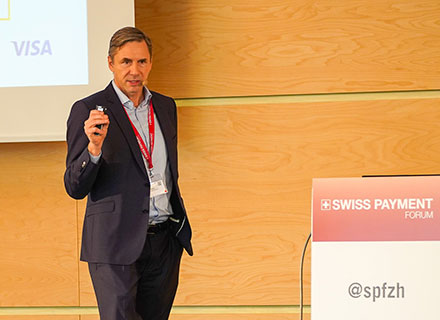How was the Swiss Payment Forum this year? What did you discuss at the event?
The Swiss Payment Forum offers a great platform to learn about the latest payment technologies and to connect with existing and potential partners. This year’s event offered several interesting presentations that gave new insights into the innovation driven future of payments and discussed the latest findings in consumer behaviour. Celebrating Visa’s 60-year anniversary I talked about Visas history our current approach and visions for the future.
It has been an eventful year for the financial services industry in Europe – can you describe the impact of Open Banking on VISA’s business model?
We’re transforming the way we do business by opening up access to Visa’s vast network and capabilities. With the launch of our Visa Developer platform, we committed ourselves to a more open and collaborative approach to innovation. The platform gives developers at merchants, financial institutions, technology companies and startups a self-serve access to some of Visa’s most popular payment capabilities such as Visa Transaction Controls, ATM-locator or currency converter. Using the Visa Developer Platform, developers can pick and choose from a suite of APIs, SDKs, and documentation for digital payment and commerce solutions. With the Visa API interfaces, financial institutions can connect to a new software system, dynamically integrate provided applications into their own program, and thus reduce their own development effort.
GDPR came into effect this year – what is your take on that?
Nothing is more important to Visa than trust and security. Safeguarding consumer data and ensuring trust are the cornerstones of our business. We believe GDPR represents an evolution of privacy principles and best practices that have long been the foundation of Visa’s approach to consumer data and policies globally.
How is the market in Switzerland for contactless payments?
Switzerland is very well equipped for contactless payments. Nearly all Visa credit and debit cards are contactless and so are more than 90 percent of the terminals. The high density of contactless terminals is one of the key factors why mobile payment solutions such as Apple Pay in 2016 or Samsung Pay in 2017 were launched in Switzerland as one of the first markets worldwide.
Reports indicate that Switzerland is still a cash-friendly market. Is this true? If so, how are companies like your aiming to effect change?
Looking at the high density of card terminals as well as cards per person in Switzerland I would describe Switzerland as a card friendly country. The latest figures from the Swiss National Bank clearly show, that the card usage in Switzerland is growing continuously for both credit and debit cards. Looking forward, there will be more change in how people transact in the next few years than we’ve seen in the past few decades. By 2020, 21 billion connected devices will lead to a dramatic increase in the number of places where secure commerce can take place. As payments become “invisible” and embedded in everyday experiences – such as Uber, Airbnb or Netflix – we continue to see our role as an enabler of secure, simple and seamless commerce.
Can you talk a bit about the power of blockchain for the financial services industry?
Blockchain is an interesting technology and we are looking at distributed ledger applications through our research facility in Palo Alto, alongside other emerging technologies such as AI and machine learning. We will continue looking for innovative ways to help us process payments effectively and produce more analytical insights.
Can you shed some light on the need for integration technology in banking today?
The evolution towards a payments landscape characterised by billions of connected devices ubiquitous contactless acceptance in physical stores, and omni-channel, ‘always on’ shopping – requires we think differently about how to provision payment credentials to consumers across the wide range of commerce environments they encounter, while maintaining and enhancing how we protect consumer information in an ever-more connected world – a large part of our response has been to introduce, the Visa Tokenisation Service (VTS). The service provides a unified platform for payments innovation, enabling Visa’s clients and partners to deliver a highly intuitive, secure payment experience regardless of the digital device or channel being used to shop.
How is Switzerland leading innovation in payments today?
In Switzerland we are able to launch new innovations very swiftly. The innovation driven approach of the local banks in addition to the closely-knit infrastructure of terminals positions Switzerland as one of the top markets to launch new technologies. The implementation of the NFC standard combined with the Visa Token Service laid the ground for mobile payment solutions for both smartphones and wearables. The Visa Token Service that is well established with our local partners also enables the frictionless cards-on-file payment experience that – in Switzerland – Netflix offers exclusively to Visa cardholders since October. With Netflix being the latest news in innovations we are looking forward to bringing more payment services to Switzerland enabling a more seamless and secure merchant and customer experiences locally and globally.
Moreover, we invite our Swiss partners to join us in our Innovation Centers in Berlin, London, Dubai, San Francisco, Singapore, Miami and Tel Aviv. Here we foster innovation by enabling our clients to collaborate and engage with Visa developers and product specialists, helping to develop the next generation of commerce experiences for consumers, merchants and businesses around the globe.
The next Swiss Payment Forum will be held on November 11 and 12, 2019

